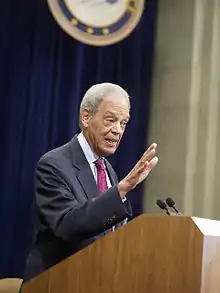Roger Wilkins
Roger Wilkins (January 29, 1932 – March 26, 2017) was an African-American civil rights leader, professor of history, and journalist.
Roger Wilkins | |
|---|---|
 | |
| 15th United States Assistant Attorney General | |
| In office 1966–1969 | |
| President | Lyndon B. Johnson |
| Preceded by | Mabel Walker Willebrandt (1929) |
| Succeeded by | Wesley Pomeroy |
| Personal details | |
| Born | January 29, 1932 Kansas City, Missouri, U.S. |
| Died | March 26, 2017 (aged 85) Kensington, Maryland, U.S. |
| Cause of death | Complications from dementia |
| Political party | Democratic Party |
| Spouse(s) | Patricia A. King (until his death) |
| Residence | Washington, D.C., U.S. |
| Alma mater | University of Michigan (A.B., J.D.) |
| Occupation | Civil rights activist, professor, historian and journalist |
Biography
Wilkins was born in Kansas City, Missouri, on January 29, 1932,[1] and grew up in Michigan. He was educated at Crispus Attucks Elementary School[2] in Kansas City, Missouri, then Creston High School in Grand Rapids, Michigan. Wilkins received his A.B. degree in 1953 and J.D. degree in 1956, both from the University of Michigan, where he interned with the NAACP and was a member of the senior leadership society, Michigamua.[3]
Career
Wilkins worked as a welfare lawyer in Ohio before becoming an Assistant Attorney General in President Lyndon B. Johnson's administration at age 33, one of the highest-ranking Blacks ever to serve in the executive branch up to that time.
Roger Wilkins was sworn in as Director of the federal Community Relations Service on Friday, February 4, 1966, in a ceremony at The White House.[4]
Leaving government in 1969 at the end of the Johnson administration, he worked briefly for the Ford Foundation before joining the editorial staff of The Washington Post.
Along with Carl Bernstein, Herbert Block ("Herblock"), and Bob Woodward, Wilkins earned a Pulitzer Prize in 1973 for exposing the Watergate scandal that eventually forced President Richard Nixon's resignation from office. He left the Post in 1974 to work for The New York Times, followed five years later by a brief stay at the now-defunct Washington Star. In 1980, he became a radio news commentator, working for National Public Radio (NPR).
Wilkins was the Robinson Professor of History and American Culture at George Mason University in Fairfax, Virginia until his retirement in 2007. During his tenure at George Mason, Wilkins was, arguably, one of the most preeminent professors in residence at that time. Wilkins was also the publisher of the NAACP's journal, The Crisis, and was the nephew of Roy Wilkins, a past executive director of the NAACP.
Wilkins resided in Washington, D.C., and was married to Patricia King, Professor of Law at Georgetown University.
Wilkins died on March 26, 2017, in Kensington, Maryland from complications of dementia. He was 85.[5]
Bibliography
- A Man's Life: An Autobiography. 1982, reprinted 1991. New York: Simon & Schuster. ISBN 0-671-22673-8.
- Quiet Riots: Race and Poverty in the United States. Edited by Wilkins and Fred Harris. 1998. New York: Pantheon Books. ISBN 0-679-72100-2.
- Jefferson's Pillow: The Founding Fathers and the Dilemma of Black Patriotism. 2001. Boston: Beacon Press. ISBN 0-8070-0956-3.
References
- Bernstein, Adam (March 27, 2017). "Roger Wilkins, civil rights champion in government and journalism, dies at 85". The Washington Post. Retrieved 27 March 2017.
- "booknotes.org".
- "U-M took a risk; a stellar career took root". Archived from the original on 2010-06-27.
- President Lyndon B. Johnson Daily Diary (PDF). 4 February 1966, p. 2. Archived from the original (PDF) on 22 June 2015.
- "Roger Wilkins, Champion of Civil Rights, Dies at 85". The New York Times. March 27, 2017. Retrieved March 27, 2017.